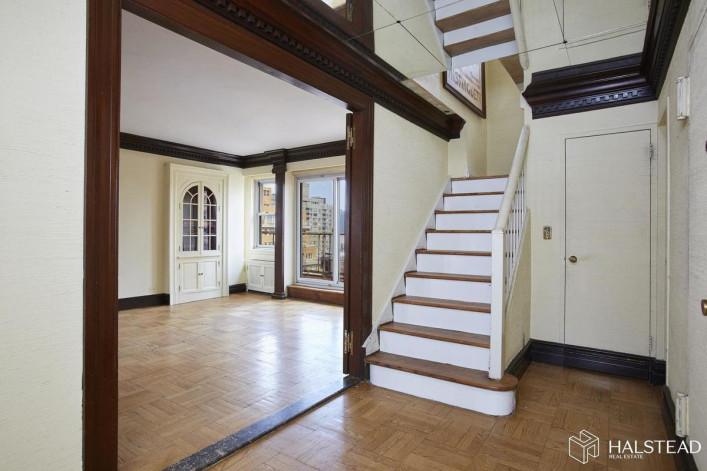What to know if you are buying an estate sale apartment or building in NYC

Estate sales often come with deep discounts, like this three-bedroom apartment in Lenox Hill that's asking $895,000. The median sales price for similar-sized apartments in the area is over $3 million.
In New York City, you don’t often come across an apartment offered at a deep discount. If you do, it may be because it is an estate sale. This usually means the property needs work, and often is on the market because the owner is elderly and moved into a care facility, or has passed away, and the family needs the proceeds of the sale. The term is also used to refer to an apartment that is just in its original condition and needs updating.
It's easy to dream big when browsing estate sales or listings sold “as is.” You imagine creating a space just as you want it. But there’s a big gap between spotting an estate sale listing and sinking into a couch in your newly renovated space.
Gully Patel would know—he bought a multi-family building in estate condition in Brooklyn with the intention of combining apartments to create a family home and renting out the other units for income. He's a software engineer who was drawn to the sale because of the price.
“We knew there were some risks. We were paying well under the market and I was willing to do the hard work and wait two to three years [before moving in], which isn’t common,” he says.
Estate sales provide an opportunity for negotiating the price but that’s often because they are complicated sales that can take many months to close. During this time, attorneys negotiate details that might include inheritance taxes, contested wills, liens, issues with the title, or building violations. If there are tenants in the building the sale can be even more fraught.
“None of them are ever easy,” says Elizabeth Kee, an agent with CORE who has lots of experience with estate sales. “You are dealing with higher legal fees and a lot of extra time,” she says.
Estate sales take many months to close
When an apartment is part of a deceased person's estate, Kee says the family doesn't usually wait until legal issues are resolved before they put it on the market.
"They want to add the apartment or building to the proceeds of the estate. They want to know the value of the property," she says. Kee has seen situations where a will is contested, which can hold up a sale while lawyers go back and forth.
One of your first tasks is to find out whether an executor has been appointed for the estate and whether the sale can actually go ahead.
"Sometimes the property comes to market because the family thinks they have Letters Testamentary [a court-issued document authorizing control of the property] and the estate is not going to be contested," says Kee. An executor needs to be appointed before the property can be sold she says and the sale won't close until other legal issues are resolved.
The "biggest issue" is the timeline for the seller to provide all the required estate documents, says Elise Kessler, real estate attorney at Braverman Greenspun. That includes copies of the will or a letter of administration if the person died without a will, lien and tax documents, an affidavit of debts and more paperwork if the person was not resident in New York at the time of death.
Patel's purchase took six months and was held up for six to eight weeks while lawyers negotiated inheritance tax issues with the IRS, which wanted to put a lien on the property.
"The biggest delay was getting a meeting with the IRS and the title company and the attorneys on both sides and getting an agreement of how the sale would be done so there was no lien on the property but the funds would go into escrow," he says.
Legal fees will mount up
What you save on the asking price, you may well pay for in the time, effort, and cost it takes in navigating a complicated sale with attorney involvement.
Having a good real estate attorney is going to be crucial to a smooth sale. The due diligence required for an estate sale is a lot more time-consuming than a regular sale. "Usually they are very hairy deals, fraught with problems and that’s why they are being sold at a discount," says Kee.
The multi-family building Patel bought included several rent-regulated apartments, which created further complications. The original owner had died two years before the sale and had given the property to a family member, who had become overwhelmed by the responsibilities of being a landlord, hadn't maintained the units, and had run-ins with the tenants. For Patel, that meant there were leases that were missing or hadn't been renewed, violations against the building for mildew and broken windows, and encroachment issues to deal with.
There won't be contingencies
The executor of the estate is unlikely to want to deal with any additional expenses or contingencies that a buyer might request in a traditional sale.
A lot of time you can do an inspection, but you can't make the sale contingent on the seller making any changes or repairs, says Kee. This means it's possible that you don't know exactly what you are getting until after you close.
"You know you are getting [the apartment] at a discount but you don’t really know how much you are going to have to deal with after closing. You either assume things work or don’t work, and they are priced accordingly," says Kee.
The single requirement is the apartment must have a working smoke detector. "That’s the only thing you can really rely on," says Kee.
There may be complications with title
As Patel found out, estate sales often come with complications over the title. You want to make sure that no one else has any claim on the property.
Title insurance is a bank requirement if you are getting a mortgage for a condo but Kee says, "Sometimes with co-ops it is very hard to make certain that the property doesn’t have any outside liens or potential family members who are trying to come after the estate."
Missing paperwork or problems with title mean the closing could be delayed. "A delayed closing can affect a buyer’s rate lock or loan commitment letter or could cost the buyer additional fees if the buyer is renting and needs to extend a lease," says Kessler.
You won't have a lot of competition
Patel says, for him, the appeal of an estate sale was "purely the price." After attending several crowded open houses, he concluded there was no room to negotiate in the Brooklyn market but an estate sale put him in "a different bracket."
"You have to be a particular type of buyer to stomach a fixer-upper," says Kee.
Shopping for an estate sale also means you are looking for something different from the regular buyer. With turn-key options out of the window, you're more likely to be looking at the view or the light or the high ceilings.
"Those are more important than the apartment itself," says Ward Welch, principal at CWB Architects, who prefers working on an apartment in bad shape that hasn’t been touched for 40 years. "The apartment can become almost anything," he says.
Listings of estate sales don't usually have very appealing photos and if the apartment in question is a co-op, you're less likely to be competing with developers.
Kee is currently marketing an estate sale co-op and says, "Buyers come in because the price is low but you also have investors, which co-ops do not like, and that cuts out 90 percent of the foot traffic."
You Might Also Like































